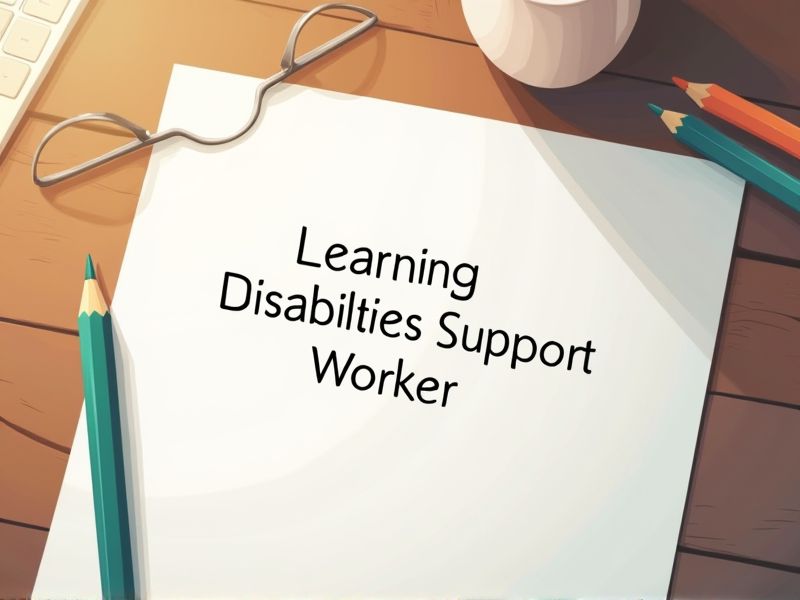
Learning Disabilities Support Workers play a crucial role in assisting individuals with unique challenges, necessitating specific skill sets to ensure competent care. Certain certifications validate essential competencies, such as understanding neurological development and fostering an inclusive environment. These credentials also signify a worker's commitment to maintaining high standards of professionalism and ethical care in the field. Here are some important certifications you may need to excel as a Learning Disabilities Support Worker.
NVQ Level 2 in Health and Social Care
A Learning Disabilities Support Worker often requires an NVQ Level 2 in Health and Social Care because it provides foundational knowledge in supporting individuals with diverse needs. This qualification ensures they understand essential communication skills and person-centered care principles crucial for fostering a supportive environment. Employers value the NVQ Level 2 as it demonstrates a worker's competence in adhering to safety and ethical standards. Without this training, workers may lack the necessary skills to effectively promote the well-being and independence of individuals with learning disabilities.
NVQ Level 3 in Health and Social Care
NVQ Level 3 in Health and Social Care provides essential skills and knowledge tailored to effectively support individuals with learning disabilities. By obtaining this qualification, workers can understand the specific needs and challenges faced by those they assist, enhancing the quality of care provided. A deeper comprehension of legal, ethical, and policy frameworks ensures that support workers maintain professional standards and comply with regulations. This qualification also opens opportunities for career advancement, thereby improving retention and expertise in the workforce.
First Aid Certification
First Aid Certification equips Learning Disabilities Support Workers with vital skills to respond effectively to medical emergencies, ensuring the safety of individuals under their care. Training can enhance a worker's confidence, enabling them to manage situations like seizures or choking, common occurrences within this demographic. Certification often meets legal or regulatory requirements for employment in many healthcare and support settings. Possession of this certification may improve job prospects, aligning with employers' expectations for comprehensive care capabilities.
CPR Certification
CPR certification equips Learning Disabilities Support Workers with crucial skills to respond effectively in life-threatening emergencies, ensuring the safety of individuals under their care. People with learning disabilities might have an increased risk of health complications; thus, workers must be prepared to intervene promptly in such situations. Certification demonstrates a commitment to professional competence, which can increase trust among families and supervisors. Possessing CPR credentials aligns with legal and organizational standards, minimizing liability for both the worker and the organization they represent.
Mental Health First Aid Certification
Mental Health First Aid Certification equips support workers with skills to identify and respond to mental health crises, which are prevalent among individuals with learning disabilities. Understanding mental health challenges enhances the support worker's ability to create a safe and inclusive environment. Certification provides evidence-based strategies, allowing the worker to effectively intervene and de-escalate situations. This training promotes early intervention, reducing potential long-term negative outcomes for individuals with learning disabilities.
Safeguarding Adults Training Certification
Safeguarding Adults Training Certification equips Learning Disabilities Support Workers with the skills to recognize and respond to signs of abuse, ensuring the safety of vulnerable individuals. Mandatory certification enhances consistency and accountability in providing care, reducing the risk of neglect or harm. Training fosters confidence among caregivers, leading to more effective support for those with learning disabilities. Certification also aligns with legal and ethical obligations, reinforcing trust within the community and among service providers.
Manual Handling Certification
Manual handling certification equips support workers with the necessary skills to safely assist individuals with learning disabilities, reducing the risk of injury to both parties. Proper training in manual handling ensures compliance with health and safety regulations, preventing potential legal issues for the employer. Certification fosters confidence in handling complex physical support tasks, which is crucial for maintaining the dignity and safety of individuals with disabilities. Knowledge gained from certification can optimize workplace ergonomics, potentially decreasing the likelihood of workplace accidents.
Infection Prevention and Control Certification
Infection Prevention and Control Certification equips Learning Disabilities Support Workers with essential knowledge to reduce the spread of infectious diseases among vulnerable populations. This certification ensures adherence to standardized safety protocols, crucial for maintaining the health and well-being of individuals with compromised immune systems. Proper infection control measures can lead to fewer medical complications and disruptions in care, enhancing the overall service quality provided to clients. Evidence-based practices learned through certification help in addressing potential outbreaks efficiently, safeguarding both support workers and those under their care.
Autism Awareness Training Certification
Implementing Autism Awareness Training Certification equips Learning Disabilities Support Workers with specialized skills to understand and address the unique needs of individuals on the autism spectrum. Enhanced comprehension of sensory sensitivities and communication challenges can lead to more effective support strategies, promoting improved client outcomes. This training fosters a more inclusive environment by enabling support workers to identify and mitigate potential triggers for individuals with autism. Certification also lends credibility and reassurance to families seeking services, knowing that workers possess a comprehensive understanding of autism.
Equality, Diversity & Inclusion Training Certification
Learning Disabilities Support Workers often encounter diverse individuals, so Equality, Diversity & Inclusion Training Certification ensures they understand and respect different backgrounds and needs effectively. This certification equips them with strategies to manage bias, promoting fair treatment and enhancing the well-being of those they support. Understanding inclusion principles helps tailor support to individuals' unique requirements, improving service quality. Enhanced knowledge of diversity can lead to better communication and relationships, fostering a supportive environment for both workers and individuals with learning disabilities.
Summary
When you, as a Learning Disabilities Support Worker, obtain certifications, it enhances your credibility and skills. This advancement can lead to increased job opportunities and potential salary increases. Employers may see you as more competent and dedicated, providing a competitive edge in the field. Furthermore, certifications often lead to better outcomes for individuals you support, improving their overall experience and progress.
